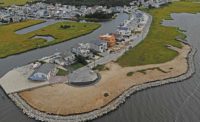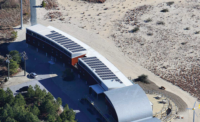Bow Lake Recycling and Transfer Station, Tukwila, Wash.
The new station, which replaced a structurally deficient open-design facility built in the 1970s, incorporates numerous energy-saving and sustainability features. The owner says the project also advances the state of the art in waste transfer facility engineering and efficient and safe operation. Mandated by King County to achieve LEED-Gold certification, the station exceeded those requirements to gain Platinum status from the U.S. Green Building Council.
The facility is located on a former landfill site, which posed the first challenge—a steep slope on one side and unsuitable soil remaining from interstate construction on the other. The team used a two-contract approach to begin site preparation while facility design was completed.
Design was challenged by the facility's need for efficiency in handling up to 2,500 tons of waste per day and in meeting sustainability mandates for its core 100,000-sq-ft transfer building. The project's design innovations include dust and odor-control misting systems, daylighting, automated lighting control and rainwater collection.
Bow Lake used materials with high recycled or rapidly renewable content including concrete rubble backfill; fly ash and slag in concrete; and asphalt with recycled roofing content. The facility also maximizes natural daylight, which allows it to use considerably less energy than the ASHRAE building society's standard for energy-efficient buildings.
The station is designed to minimize water contact with refuse to reduce wastewater leachate into sanitary sewer treatment facilities and into the stormwater system. Contractors exceeded the LEED standard in diverting more than 97% of construction waste from landfills.
Other features include a split-level waste tipping floor that protects residential customers from commercial vehicles and waste handling operations. A computer-controlled automated traffic management system manages the flow of large waste transfer trailers and private vehicles—the first application of this technology in a high-volume U.S. transfer station, the team says.
A focus on team coordination and quality control allowed the $92-million facility to finish on schedule and about 4% under budget, the owner says. Bow Lake's LEED-Platinum rating contributed to a county mandate that all future capital projects achieve similar certification—only the second U.S. jurisdiction to do so. Also, the project's rainwater harvesting system was a factor in changing Washington state law to allow for private rainwater collection.
Judges noted the project's "exceptional design" and said it was "phenomenally organized."
Key Players
Owner King County Solid Waste Division
General Contractor (Site Prep) Gary Merlino Construction
General Contractor (Site Facilities) Lydig Construction
Construction Manager KPFF Consulting Engineers
Lead Design Firm SAIC Energy, Environment & Infrastructure (now known as Leidos)
Consulting Project Mgr./Structural Engineer Leidos
Structural Engineer (Steel) MLA Engineering
Architectural/Sustainable Design KPG Inc.
Mechanical Engineer LNS Engineers
Electrical Engineer Interface Engineering







Post a comment to this article
Report Abusive Comment